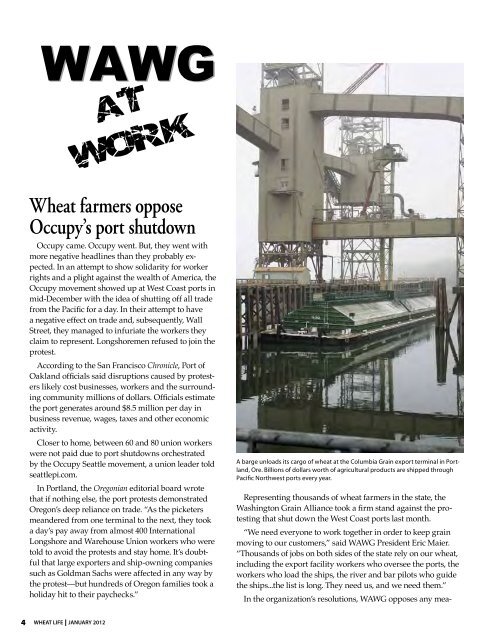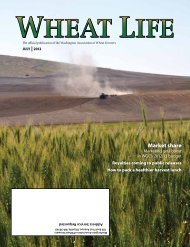Download - Wheat Life
Download - Wheat Life
Download - Wheat Life
Create successful ePaper yourself
Turn your PDF publications into a flip-book with our unique Google optimized e-Paper software.
WAWG<br />
at<br />
work<br />
<strong>Wheat</strong> farmers oppose<br />
Occupy’s port shutdown<br />
Occupy came. Occupy went. But, they went with<br />
more negative headlines than they probably expected.<br />
In an attempt to show solidarity for worker<br />
rights and a plight against the wealth of America, the<br />
Occupy movement showed up at West Coast ports in<br />
mid-December with the idea of shutting off all trade<br />
from the Pacific for a day. In their attempt to have<br />
a negative effect on trade and, subsequently, Wall<br />
Street, they managed to infuriate the workers they<br />
claim to represent. Longshoremen refused to join the<br />
protest.<br />
According to the San Francisco Chronicle, Port of<br />
Oakland officials said disruptions caused by protesters<br />
likely cost businesses, workers and the surrounding<br />
community millions of dollars. Officials estimate<br />
the port generates around $8.5 million per day in<br />
business revenue, wages, taxes and other economic<br />
activity.<br />
Closer to home, between 60 and 80 union workers<br />
were not paid due to port shutdowns orchestrated<br />
by the Occupy Seattle movement, a union leader told<br />
seattlepi.com.<br />
In Portland, the Oregonian editorial board wrote<br />
that if nothing else, the port protests demonstrated<br />
Oregon’s deep reliance on trade. “As the picketers<br />
meandered from one terminal to the next, they took<br />
a day’s pay away from almost 400 International<br />
Longshore and Warehouse Union workers who were<br />
told to avoid the protests and stay home. It’s doubtful<br />
that large exporters and ship-owning companies<br />
such as Goldman Sachs were affected in any way by<br />
the protest—but hundreds of Oregon families took a<br />
holiday hit to their paychecks.”<br />
A barge unloads its cargo of wheat at the Columbia Grain export terminal in Portland,<br />
Ore. Billions of dollars worth of agricultural products are shipped through<br />
Pacific Northwest ports every year.<br />
Representing thousands of wheat farmers in the state, the<br />
Washington Grain Alliance took a firm stand against the protesting<br />
that shut down the West Coast ports last month.<br />
“We need everyone to work together in order to keep grain<br />
moving to our customers,” said WAWG President Eric Maier.<br />
“Thousands of jobs on both sides of the state rely on our wheat,<br />
including the export facility workers who oversee the ports, the<br />
workers who load the ships, the river and bar pilots who guide<br />
the ships...the list is long. They need us, and we need them.”<br />
In the organization’s resolutions, WAWG opposes any mea-<br />
4 WHEAT LIFE JANUARY 2012










